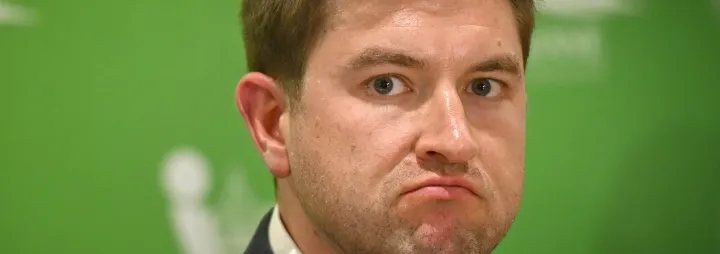STATE OF THE CAPITAL
Tshwane’s financial rescue mission is far from complete, says Mayor Cilliers Brink

The City of Tshwane has limped from one crisis to another in the past year — and now Mayor Cilliers Brink says his administration is rebuilding what has been broken.
A year after being elected executive mayor of the embattled City of Tshwane, Cilliers Brink says that while the metro’s financial rescue mission is far from over, he is optimistic it will be solved.
He made the remarks while delivering his second State of the Capital Address during an extraordinary council meeting on Thursday.
“A great deal of work still needs to be done. The stakes cannot be higher,” he said.
Brink also used the address to note the successes of the DA-led multiparty government, which has come under scrutiny from opposition political parties for deteriorating service delivery, with the EFF saying that services are only delivered to affluent areas.
“We are working every day to win back your trust and to fix what has been broken. But I also appreciate that what we say will be less important than what we do,” Brink said.
For years, the Tshwane metro has been on a downward trajectory, marred by political instability and tight fiscal pressures as it battled with service delivery problems, including providing access to potable water and electricity.
In February, all the Gauteng metros — Johannesburg, Ekurhuleni and Tshwane — were in deep trouble after the National Treasury announced its intention to cut a combined R1.83-billion in development allocation grants because of underperformance.
Read more in Daily Maverick: Short-changed — National Treasury threatens to halt more than a billion rand to Gauteng metros
The City of Tshwane received an adverse audit opinion from the Auditor-General for the 2021/22 financial year when it racked up R1.2-billion in wasteful expenditure. This, however, slightly improved in the 2022/23 financial year when it received a qualified audit opinion.
“Two of the three adverse findings by the Auditor-General have been cleared, namely cash flow and creditors. This year, we will clear the last one related to property, plant and equipment, and I am confident that we will achieve an unqualified audit,” Brink said.
Tshwane has been accused of mismanaging its budget of R46-billion. For a greater part of 2023, it could not pay its debtors, including Eskom and Rand Water.
On Thursday, Brink’s address began and ended earlier than expected — before the arrival of some opposition parties and media. Councillors from the DA and ANC told Daily Maverick this was an attempt to avert delays and chaos, which had become a common occurrence in the chambers.
Brink, however, told journalists: “We are very sorry about that. Usually, politicians are late. We are not usually early, but I think it was a misunderstanding between us and the Office of the Speaker.”
Brink said a funding plan that set out in detail how the city aimed to increase income and reduce distribution losses over the next two years was out for public participation.
Part of the city’s financial rescue mission is to collect an additional R1-billion a month for the next six months from defaulting customers and businesses. It currently collects almost R3-billion a month, but has a massive deficit.
Brink has repeatedly said his administration intends to convert the R23.3-billion in its debtors’ book into cash.
Read more in Daily Maverick: City of Tshwane seeks R1bn a month from debtors to solve financial crisis
‘No confidence’
Reacting to the speech, Joel Masilela ka Mahlangu, the spokesperson for ANC’s Greater Tshwane caucus, said: “We do not have any confidence in his address nor do we have confidence in his leadership and his MMCs.
“As the ANC, we know that our people are very unhappy with this government. The national government and provincial government have intervened on numerous occasions to a point that the National Treasury had to take money back because the city does not have a commitment [to] spending the use grants in impoverished communities.”
The ANC, which sits on opposition benches, was considering tabling a motion of no confidence against Brink, Masilela ka Mahlangu said. However, it does not have the numbers to succeed.
He said the move would highlight the plight of residents and strengthen the party’s case when it approached the provincial government to put the municipality under administration.
The Congress of South African Trade Unions (Cosatu) in Gauteng slammed the city’s escalating debt, with more than R3-billion owed to Eskom, saying it “raises serious concerns about its ability to meet its financial obligations and deliver essential services to the residents”.
Crisis to crisis
Throughout his tenure, Brink has had his hands full dealing with one crisis after another, including a four-month illegal strike for wage increases that began on 26 July 2023 and ended in November.
The strike led to the collapse of services including waste collection, attending to electricity and water outages and fixing leaks, potholes and streetlights. It turned violent and 255 vehicles belonging to the city were torched.
Read more in Daily Maverick: Financially distressed Tshwane battles with ongoing strike, water shortages and service delivery failures
The city also battled a cholera outbreak in 2023 which claimed the lives of 23 people in Hammanskraal, in Tshwane’s north. Brink said the city had allocated R450-million for upgrading the Rooiwal Wastewater Treatment Plant over three years.
“R150-million of this first allocation is in the process of being transferred to the Development Bank of Southern Africa and the completion of Phase 1 upgrades is under way.
“Other crucial initiatives for the enhancement and maintenance of water and sanitation infrastructure within the city include the following:
- “Replace, upgrade and construct wastewater treatment facilities — R92-million;
- Replace worn-out water network pipes — R66-million; and
- Expand reservoirs — R65-million.” DM


















Comments - Please login in order to comment.